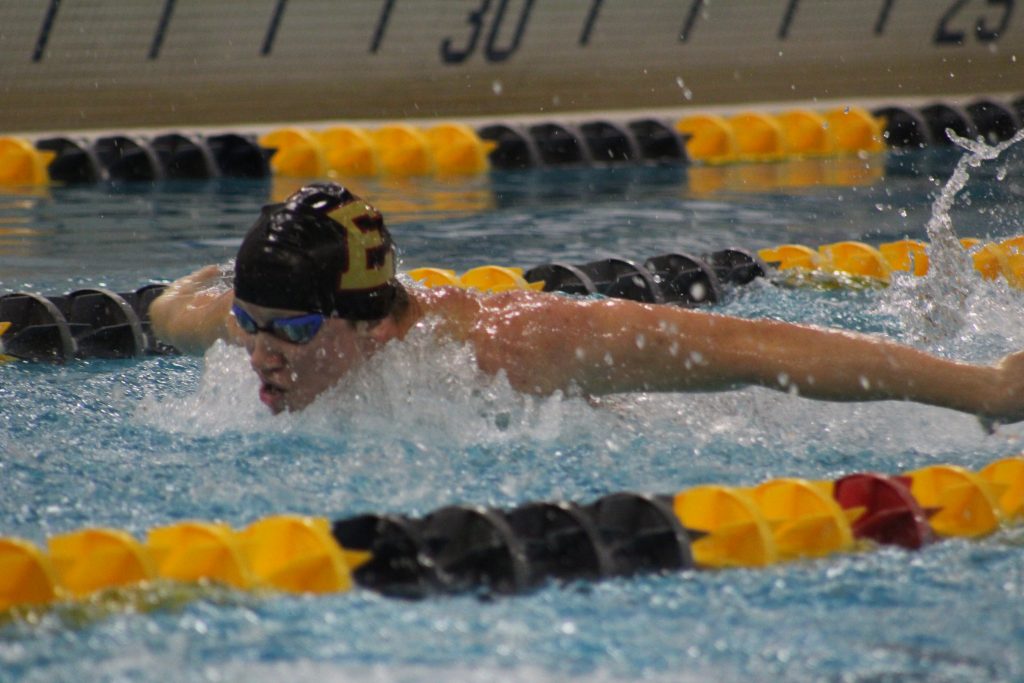
“I am a man of integrity, discipline, and wisdom. That’s what I tell myself every morning,” freshman psychology major Ralphie Weakland, a member of Drexel’s Men Swimming & Diving team, nobly opened the conversation. His athletic abilities in the pool are uniquely coupled with high emotional intelligence shown through his compassion for others despite his reserved demeanor. He is naturally introverted and comfortable with the quiet, which allows him to channel his sensitivity to everyday stimuli. “I’m just a guy who’s doing my best to better myself every day for my family, my friends, and the people around me.”
At the age of five, Weakland developed a love of swimming and dreamed of competing in the Olympics. After suffering an injury that took him out for only five months, the activity he dedicated himself to daily became very difficult.
Instead of drowning in defeat his recovery period propelled him to become more open-minded, allowing him to define his own “pro lifestyle.” He maintains his peace of mind through creative activities and daily meditation which give him clarity to express himself to his loved ones. By sharing his thoughts with the world, especially troubling ones, he relieves himself of pressure.
This has allowed him to create better harmony with his ego, which he discovered is “not really there.” The self-defeating thoughts in the back of his mind, the fear of bigger and faster competitors, became neutral and less audible, stripping their power away. With less attachment to outside circumstances, Weakland remains adaptable in the moment, always refocusing his energy to fine-tune areas of importance.
His mind is presently focused on maintaining his physical health and cultivating victories within Drexel’s swim conference and the local community. To others struggling with their mind, Weakland says, “If you don’t appreciate the small things, you can’t appreciate the big things.” He mentioned even the smallest things like brushing his teeth before bed after hours of studying is a win, “you got to tell yourself you’re proud of yourself for staying disciplined.”
Along with gratitude and discipline, Weakland encourages us to resist morally wrong influences and not be afraid of our truth despite lies being easier to digest. He particularly encourages his male peers to deny social stereotypes of toxic masculinity. Being tough, not crying and hiding one’s emotions are unnecessary because “we all have emotions and things to hide, that’s what makes us human, and that’s what makes us interesting.”
Weakland believes that humans are complex beings with the ability to transform every day, especially as the seasons of life force us to flow with them. Like water itself, people take on the form of the container that they are in. We have tendencies to choose containers like water bottles, limited and docile, when we are capable of being riverbeds full of life, inviting adventure and commanding respect.
Weakland observes Drexel as an ecosystem for kids to transition into adults, which he sees as both inspiring and demoralizing. He sees people with lots of potential, fully equipped with their tools for success, fail to push themselves to learn and take advantage of resources like job opportunities, educated professors and others to grow with. However, “on the other hand I see people who started off struggling, and really had to push themselves, and discipline themselves to take it to the next level and that’s been really inspiring.”
A recurring theme that Weakland comes across in people is a sense of shame and struggle when asking for help. As a child, Weakland watched his mother work multiple jobs on her own, and that conditioned him to be hyper-self-reliant.This hurt him down the line when responsibilities became too great. He noticed many others dealt with this resistance to share their burdens and wondered, “What if everyone is scared to ask for help?” This gave the conversation a sense of universal understanding and comfort.
Weakland continues to show strength through his vulnerability, speaking candidly about his own mental health struggles like anxiety, as well as seasonal depression during Philly’s dreary winter. Returning home to Florida during spring break highlighted the importance of simple gifts like sunlight. Weakland sees this gift shine on campus through Drexel lawns blooming with students bonding through sun-encouraged activities, joining them to play spike ball with his teammates.
As the Drexel campus continues to sprout new student memories both good and bad, Weakland reminds us of the encouraging truth: “Time is irrelevant… I’ve been seeing the trees in spring. Some of them still look dead, and some of them haven’t bloomed at all. That doesn’t mean they’re incapable of thriving. Maybe it’s because there’s a building blocking most of the sunlight. They can’t get up and walk somewhere else, they have to just accept their time.”
After accepting and cherishing the time left during the 2024 spring quarter, summer is ahead. During his freshman summer, Weakland plans to continue to use his talents to support others and save lives by coaching and teaching swim lessons. Swimming is one of many universal tools Weakland has discovered to master his internal world as he seeks to leave no stone of opportunity unturned in this lifetime. As he uncovers his true calling, he wants to travel to places like the Grand Canyon and Yellowstone and continue to share these adventures with those closest to his heart.


